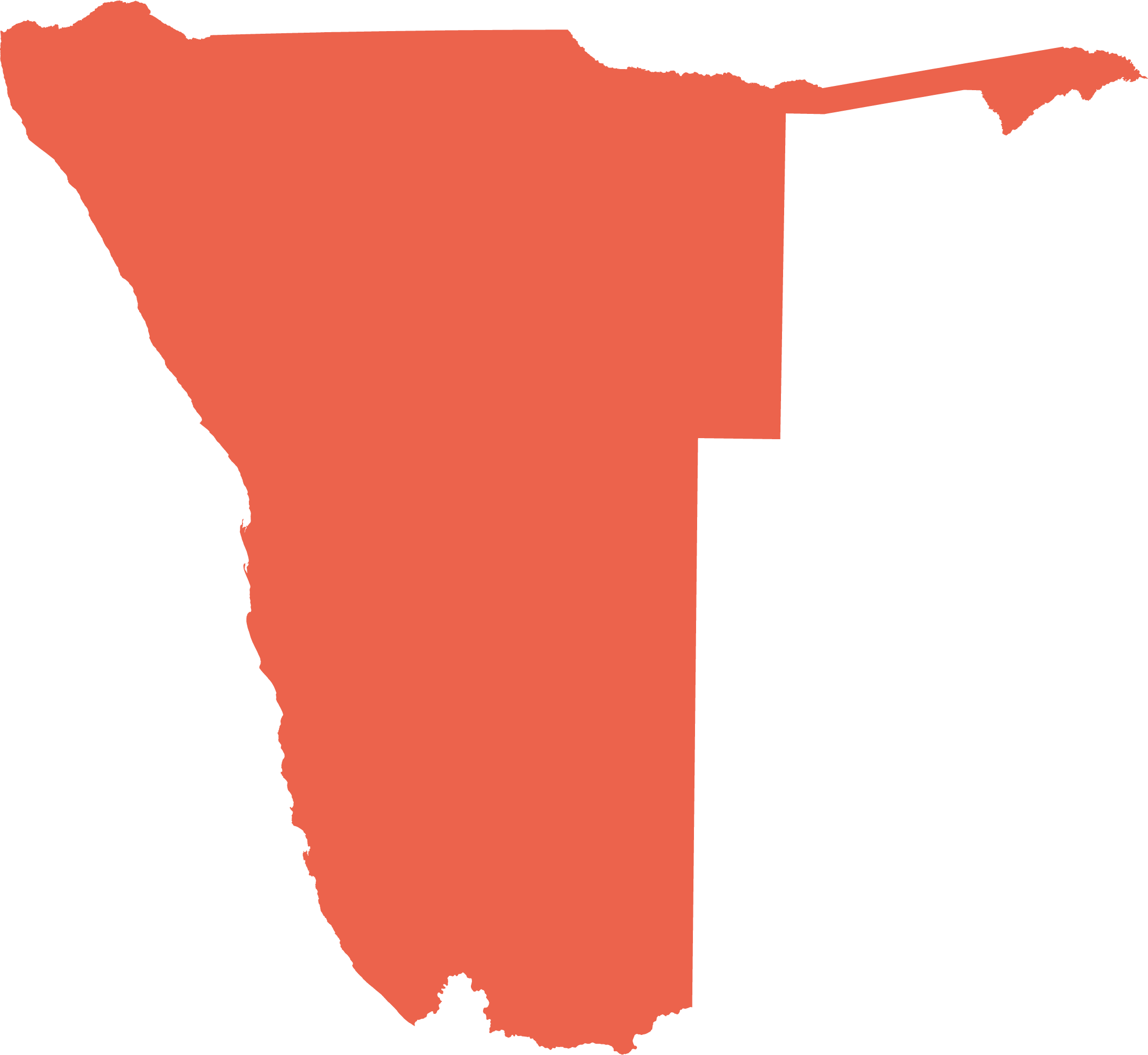Human happiness and wellbeing
Standard economic models such as those in use in Namibia today are based on the growth and value of goods and services in the economy. The key parameter measured by most conventional economic models is gross domestic product (GDP),12 which is the total value of tangible services and goods produced annually. However, many scientists and other people question the value of GDP as a measure of progress and new measures of the quality of life are being advanced, including that of human wellbeing and human happiness.13
10.10 Progress towards achieving the Sustainable Development Goals (SDGs), 2015–201914
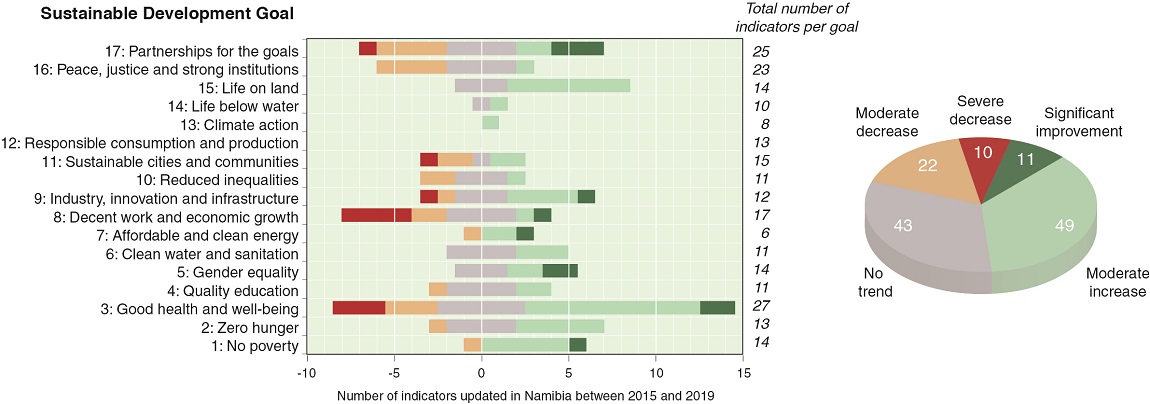
The United Nations established 17 Sustainable Development Goals (SDGs) that member countries aim to achieve by 2030. Each goal is listed on the left-hand side of the graph. Change is assessed using a number of indicators for each goal (shown on right-hand axis). The number of indicators updated in Namibia between 2015 and 2019 for each SDG can be added together from the bars in the graph. For example, seven indicators, out of 14, were used to assess progress in abolishing poverty. Notable improvements were made in eradicating poverty and hunger, raising gender equality and improving life on land, but Namibia's scores on decent work and economic growth, and on peace and justice deteriorated. The overall trends for Namibia's 135 indicators are summarised in the pie chart (right).
10.11 Income Gini coefficient, 1994–201615

Namibia has made significant progress in reducing this measure of income inequality over the past 30 years, as reflected in its Gini coefficient decreasing from 0.70 in 1994 to 0.56 in 2016. While Namibia now has greater income equality than before, major gaps in wealth remain. Closing these gaps is important, for example, by creating opportunities for those less fortunate to become wealthier, and by ensuring that excess wealth is used for the benefit of Namibia.
10.12 Wellbeing in Namibia ranked against African and other countries, 202116
| Namibia's ranking | ||
|---|---|---|
| Measure | Out of 41 countries in Africa | Out of 108 countries worldwide |
| Overall happiness | 24 | 99 |
| Social support | 4 | 82 |
| Freedom to make life choices | 22 | 88 |
| Generosity | 35 | 86 |
| Perceived corruption | 31 | 71 |
| Life expectancy | 21 | 106 |
In a global survey, Namibia's social support scored well against other African countries, but perceptions of corruption were high. On all scores, Namibia was in the lowest third when compared to countries elsewhere in the world.
10.13 Measures of happiness in Namibia and 40 other African countries 202116
Overall happiness


Social support


Freedom to make life choices

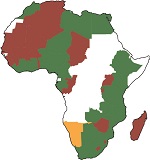
Generosity

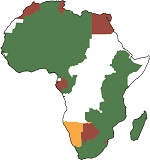
Perceived corruption

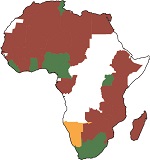
Life expectancy
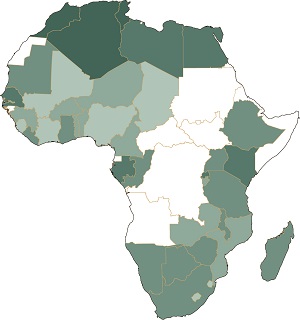
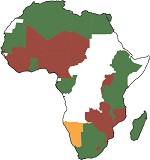


These maps compare happiness in Namibia with other countries in Africa for which such measures are available, while a similar comparison with 108 countries elsewhere in the world is given in the table above. Life expectancies at birth are based on the World Health Organization's Global Health Observatory data, while other measures of happiness were assessed by the Gallup World Poll in answer to these questions:
- Happiness: 'Imagine a ladder, with steps numbered from 0 at the bottom to 10 at the top. The top of the ladder represents the best possible life for you and the bottom of the ladder represents the worst possible life for you. On which step of the ladder would you say you stand now?'
- Social support: 'If you were in trouble, do you have relatives or friends you can count on to help you whenever you need them, or not?'
- Freedom to make life choices: 'Are you satisfied or dissatisfied with your freedom to choose what you do with your life?'
- Generosity: 'Have you donated money to a charity in the past month?'
- Perception of corruption was taken as the average of two questions: 'Is corruption widespread throughout the government or not?' and, 'Is corruption widespread within businesses or not?' These questions focus largely on bribery and do not gauge levels of elite state capture or kleptocracy
» View/download map - Overall happiness - by country (jpg)
» View/download map - Overall happiness - comparison with Namibia (jpg)
» View/download map - Social support - by country (jpg)
» View/download map - Social support - comparison with Namibia (jpg)
» View/download map - Freedom to make life choices - by country (jpg)
» View/download map - Freedom to make life choices - comparison with Namibia (jpg)
» View/download map - Generosity - by country (jpg)
» View/download map - Generosity - comparison with Namibia (jpg)
» View/download map - Perceived corruption - by country (jpg)
» View/download map - Perceived corruption - comparison with Namibia (jpg)
» View/download map - Life expectancy - by country (jpg)
» View/download map - Life expectancy - comparison with Namibia (jpg)
» View/download legend - by country (jpg)
